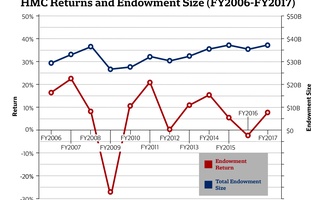{shortcode-b423261b5f39a4481e9183003ac445dfb7b91d68}In a year when most institutional investors rode out robust public markets, Harvard’s 8.1 percent investment return for fiscal year 2017 placed it last among Ivy League endowments.
Dartmouth, which has one of the smallest endowments in the Ivy League at $4.96 billion, did the best during the year. Its 14.6 percent return, buoyed by strong growth in public equities, grew its endowment to the largest it has ever been.
Yale, often the leader of Ivy League endowments, came in seventh place this year with an 11.3 percent investment return. Experts attribute it to the university’s heavy investment in alternative assets which, they argue, buffer Yale from an unexpected swings in the market or financial crashes.
While most Ivy League endowments were able to capitalize on the bull market in fiscal year 2017, Harvard’s performance was weighed down by a series of high-value markdowns it took on some of its investments. The University’s financial report, released last week, detailed a nearly $10 billion markdown on domestic fixed income assets, which include investments like treasury bonds, junk bonds, and corporate bonds.
It was a surprisingly high markdown for Charles A. Skorina, a financial headhunter who often analyzes the performance of institutional investors. He said the size of the markdown indicates that Harvard Management Company’s new CEO, N.P. Narvekar, has recognized that the portfolio was poorly constructed.
“You seldom see that,” Skorina said. “We usually see markdowns when the market crashes. If they’re writing down stuff, there must’ve been just awful stuff in their portfolio.”
Skorina added that Narvekar likely “bit the bullet,” intentionally setting the markdowns in his first year of leadership so any damaging assets won’t affect future years of performance.
“Narv’s smart. Better to take the big write off now and have nice returns after,” Skorina said. “Everyone will forgive you for the early years if you perform well.”
Narvekar said the firm will spend the next few years “repositioning” its portfolio in his annual endowment report. In some cases, that might mean selling off assets, as HMC has done with some private equity and natural resources investments. In others, the firm might simply mark down an asset. For the fiscal year, Harvard marked down its natural resources portfolio by $1 billion.
The changes are part of an ambitious restructuring Narvekar has launched since he started his tenure in January to address “deep structural problems at HMC.”
David E. Kaiser ’69, an alum who has regularly criticized the firm and pushed for it to become more transparent, said Narvekar’s letter was “the first time that anybody in authority at HMC or the University has admitted that something is seriously wrong, which had been fairly clear for some time.”
These returns mark the first under Narvekar’s leadership, but because he took the helm of the firm in the middle of the fiscal year, next year’s returns may provide a fuller picture of HMC’s performance with him in charge.
Narvekar led Columbia University’s endowment during the first part of the fiscal year. It returned 13.7 percent, the third best in the Ivy League.
—Staff writer Brandon J. Dixon can be reached at brandon.dixon@thecrimson.com. Follow him on Twitter @BrandonJoDixon.Read more in University News
UC Leaders Meet with Presidential Search Committee MemberRecommended Articles
-
Three Investment Managers To Depart HMC to Form Hedge FundsWeeks after the Harvard Management Company announced its intent to lay off nearly half of its 230-person staff, three of the firm’s investment managers will leave the company to form their own hedge funds, according to Bloomberg.
-
Harvard’s Endowment Plans to Sell $70 Million of Cows and Farmland AssetsNot even Harvard’s cows are safe as Harvard Management Company undergoes a radical restructuring that it hopes will reverse a decade of lackluster returns.
-
HMC to Unload Private Equity AssetsHarvard Management Company—the firm managing Harvard’s $35.7 billion endowment—is nearing the final stage in talks to sell over $2 billion in private equity and real estate assets to Lexington Partners.
-
 Asset Breakdown Absent from HMC Report
Asset Breakdown Absent from HMC Report -
 Harvard’s Endowment Returns, Explained
Harvard’s Endowment Returns, Explained













